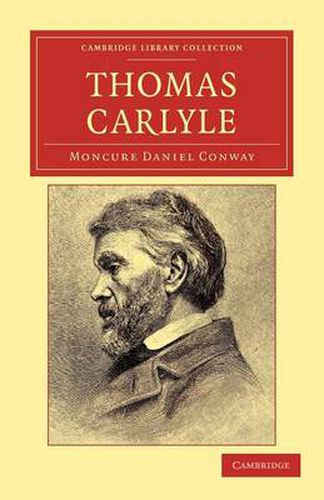Readings Newsletter
Become a Readings Member to make your shopping experience even easier.
Sign in or sign up for free!
You’re not far away from qualifying for FREE standard shipping within Australia
You’ve qualified for FREE standard shipping within Australia
The cart is loading…






Moncure Daniel Conway (1832-1907), the son of a Virginian plantation-owner, became a Unitarian minister but his anti-slavery views made him controversial. He later became a freethinker, and following the outbreak of the Civil War, which deeply divided his own family, he left the United States for England in 1863. He gained a reputation as the ‘least orthodox preacher in London’, and was acquainted with many figures in the literary and scientific world, including Charles Dickens and Charles Darwin. This memoir of Thomas Carlyle, another friend, was published in 1881 soon after Carlyle’s death. Carlyle had not wanted to be the subject of a biography, and reluctantly authorised J. A. Froude to write one, but Conway rushed into print this somewhat hagiographical account because he was concerned, with reason, about the damage Froude’s frank biography (published in 1882-4 and also reissued in this series) might do to Carlyle’s reputation.
$9.00 standard shipping within Australia
FREE standard shipping within Australia for orders over $100.00
Express & International shipping calculated at checkout
Stock availability can be subject to change without notice. We recommend calling the shop or contacting our online team to check availability of low stock items. Please see our Shopping Online page for more details.
Moncure Daniel Conway (1832-1907), the son of a Virginian plantation-owner, became a Unitarian minister but his anti-slavery views made him controversial. He later became a freethinker, and following the outbreak of the Civil War, which deeply divided his own family, he left the United States for England in 1863. He gained a reputation as the ‘least orthodox preacher in London’, and was acquainted with many figures in the literary and scientific world, including Charles Dickens and Charles Darwin. This memoir of Thomas Carlyle, another friend, was published in 1881 soon after Carlyle’s death. Carlyle had not wanted to be the subject of a biography, and reluctantly authorised J. A. Froude to write one, but Conway rushed into print this somewhat hagiographical account because he was concerned, with reason, about the damage Froude’s frank biography (published in 1882-4 and also reissued in this series) might do to Carlyle’s reputation.